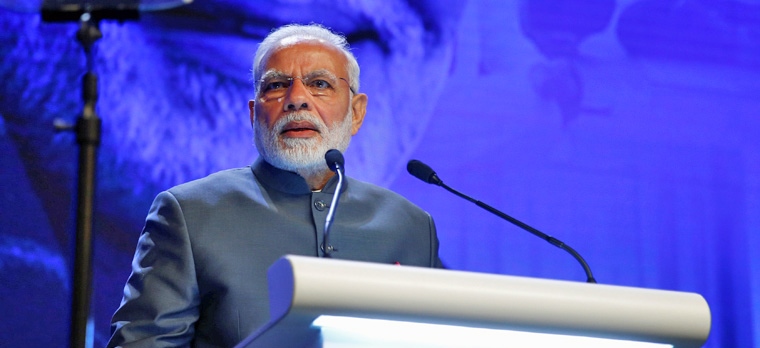Strategic Autonomy or Silence?
June 2, 2018 | Expert Insights

Prime Minister Narendra Modi has delivered the keynote speech at the 2018 IISS Shangri-La Dialogue in Singapore on the 1st of June.
He is the first Indian Prime Minister to deliver a key note at the 17th Shangri La dialogue.
Background:
Since 2002, the Asian Security Summit has seen top government and defense personnel across the world convene to discuss regional challenges and threats. It is a Track 1 diplomatic event held with the independent British think-tank International Institute for Strategic Studies (IISS). The dialogue provides a platform for multilateral meetings between 28 Asia-Pacific states to advance new security policies and initiatives ranging from small arms and ammunition to maritime security and nuclear war.
Official delegations from within and outside Asia can present their state’s concerns and recommendations on areas highlighted in the agenda. Amongst this year’s Plenary Sessions, those on maritime security in the South China Sea, cooperation in the Indian Ocean, North Korea’s nuclear future as well as the humanitarian crisis in the Rakhine State (Myanmar) are of particular importance.
Analysis:
Prime Minister Narendra Modi delivered a key note speech at Shangri La dialogue last evening. He spoke about the importance of the Indo Pacific region to the Indian sub-continent. Mr Modi affirmed the need for countries to adhere to the rule of law, open seas and freedom to navigate to ensure prosperity of this region. He stressed the need for ensuring diversity at home and inclusiveness globally.
Amongst the topics for the Plenary Sessions, the South China Sea dispute demands immediate mediation amongst the primary parties as tensions have weakened historical trade between them. Security deliberations at the summit will not only surmise Chinese military deployments, but also provide Brunei, Indonesia, Philippines, and Vietnam an opportunity to present de-escalation as a viable solution.
Denuclearization of the Korean peninsula assumes pivotal importance in light of the upcoming US-DPRK Summit. ASEAN has a unique capacity to mediate as it can prevent major power proxy rivalry in the region while reversing the effects of nascent regionalism. Furthermore, countering terrorism in the region is a prime policy objective of many of the nations who face both homegrown and state sponsored incidents of terrorism.
Shifting away from the traditional ally of China, India’s relationship with USA has only grown with increasing Chinese military presence at the border. The US Pacific Command changed its official name to the Indo-Pacific Command on the 31st of May. Secretary of Defense James Mattis said this change is in recognition of growing connectivity between the Indian and Pacific Oceans as the countries in these regions, primarily India and USA, have strengthened their diplomatic and military relations. On the other hand, India and Singapore’s plan to establish a framework to enhance naval coordination may bolster India’s regional naval competence and defense mechanisms.
India has been navigating through precarious regional situations with strategic silence, as in the Doklam issue, or through direct mediation. For issues closer to home, say Myanmar, India can respond through positive action; however, territorial disputes may be treated differently as economic considerations may reign supreme. Yet, prolonged silence has minimal gains. Moreover, the Asian Security Summit can be used to India’s advantage in order to strengthen regional relations, especially with ASEAN.
Counterpoint:
‘Sinologists’ view the new policies of USA and China as the latter’s attempt to establish a sino-centric alternative to the liberal Western order. Termed as the “China Solution,” Xi Jinping’s policy to counter the free-market objectives of USA and her allies has been lauded by members of the Chinese Communist Party (CCP). The OBOR project further supports this new Sino-centric order which denounces USA’s call for a “rule-based” system in the region.
Assessment
Our assessment is that the forum provides an important platform for India to advance its regional importance in the Indian Ocean Region (IOR). We believe that Prime Minister Narendra Modi’s keynote address will be scrutinized for the role New Delhi is willing to play, the principles that are core to it, and the action it is willing to take in defense of them.








Comments